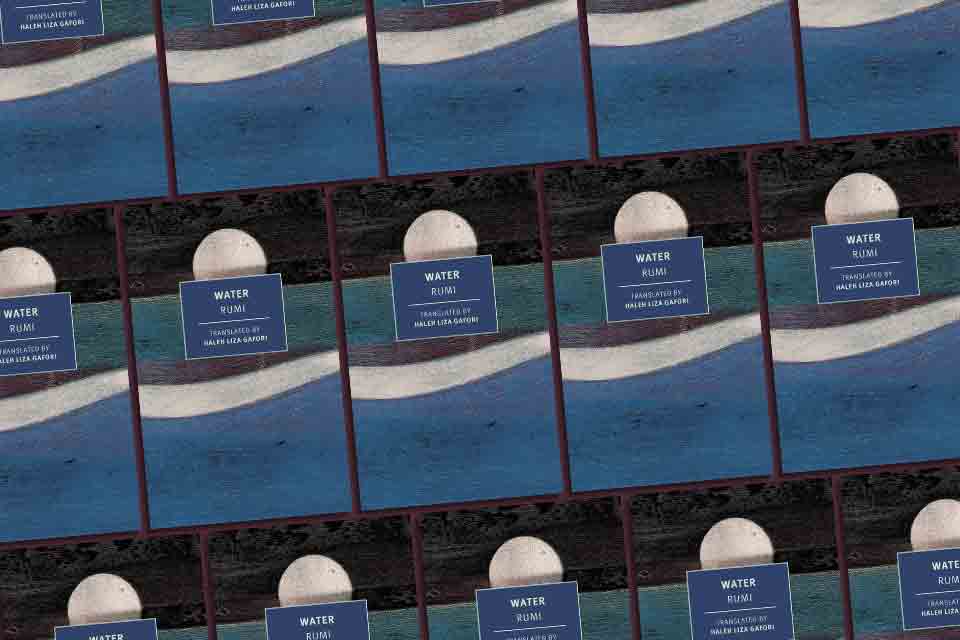
Friedrich Schleiermacher, in his 1813 lecture On the Different Methods of Translating, famously proposed that translators face two paths: to “leave the author in peace and move the reader toward him,” or to “leave the reader in peace and move the author toward him.” In Water (NYRB Classics, 2025), her second volume of Rumi translations following Gold, poet Haleh Liza Gafori consciously chooses the latter path—guiding Rumi’s thirteenth-century Persian mysticism gently toward contemporary English readers without betraying his original spiritual essence.
Gafori’s curatorial vision shapes this collection of fifty-four poems, primarily from the Divan-i Shams. These aren’t randomly selected verses but poems that spoke to her as a Persian poet and that she recognizes will speak to today’s world. The title, Water, reveals her thematic focus—these translations flow toward what nourishes love and life, offering spiritual sustenance for our fractured present. Her selection transforms the book from translation to artistic intervention, bringing forward those aspects of Rumi most urgently needed now.
These translations flow toward what nourishes love and life, offering spiritual sustenance for our fractured present.
What distinguishes Gafori’s approach is her willingness to reimagine the poems’ architecture for clarity. She doesn’t pursue word-for-word fidelity; instead, she sometimes reorders lines, combines couplets, or adds explanatory phrases where needed. In certain passages, her work becomes translation-plus-commentary, ensuring English readers without knowledge of Persian contexts can access Rumi’s layered meanings. While purists might object, this method serves her chosen path—bringing the author to readers rather than demanding they traverse centuries and cultures unaided.
Gafori occupies a unique position among Rumi translators. Unlike Coleman Barks’s free interpretations—beautiful yet sometimes detached from religious and cultural roots—Gafori brings triple authority: a Persian poet who understands the source language intimately, someone well versed in Sufi traditions and Persian folktales, and a practicing artist who recognizes poetry’s essential music. Yet unlike academic translations prioritizing technical accuracy over readability, her versions maintain lyrical flow. The result moves “as water itself” while remaining a reliable vessel to Rumi’s vision.
Gafori’s identity as a poet infuses these translations with living dialogue. She engages Rumi poet-to-poet across centuries, drawing out themes that challenge contemporary biases. Her poet’s ear guides crucial decisions about when literal fidelity must yield to poetic truth, ensuring what crosses the linguistic bridge isn’t just meaning but music, not just ideas but poetry’s transformative power.
Gafori engages Rumi poet-to-poet across centuries, drawing out themes that challenge contemporary biases.
The progression from Gold to Water marks Gafori’s maturation as a translator—her language now flows with the very fluidity her title promises, assured and natural. Together, these volumes demonstrate a poet-translator illuminating different dimensions of Rumi while perfecting her craft as a literary bridge.
For readers seeking Rumi in English, Gafori offers something valuable: a middle path more authentic than popularized versions, more approachable than scholarly editions. By choosing to move Rumi toward modern readers, she paradoxically brings those readers closer to his original intent than a strictly literal translation might achieve. Water succeeds as both faithful translation and timely intervention, proving that sometimes the most loyal translation ensures poetry remains alive, relevant, and transformative.
University of Oklahoma
Editorial note: Gafori will visit the University of Oklahoma as the 2026 Puterbaugh Fellow and writer-in-residence for the Puterbaugh Lit Fest (April 2–3, 2026), which will culminate with a Nowruz concert co-sponsored by the OU School of Music, the Farzaneh Family Center for Iranian & Persian Gulf Studies, and the Norman Arts Council on the evening of April 3.
